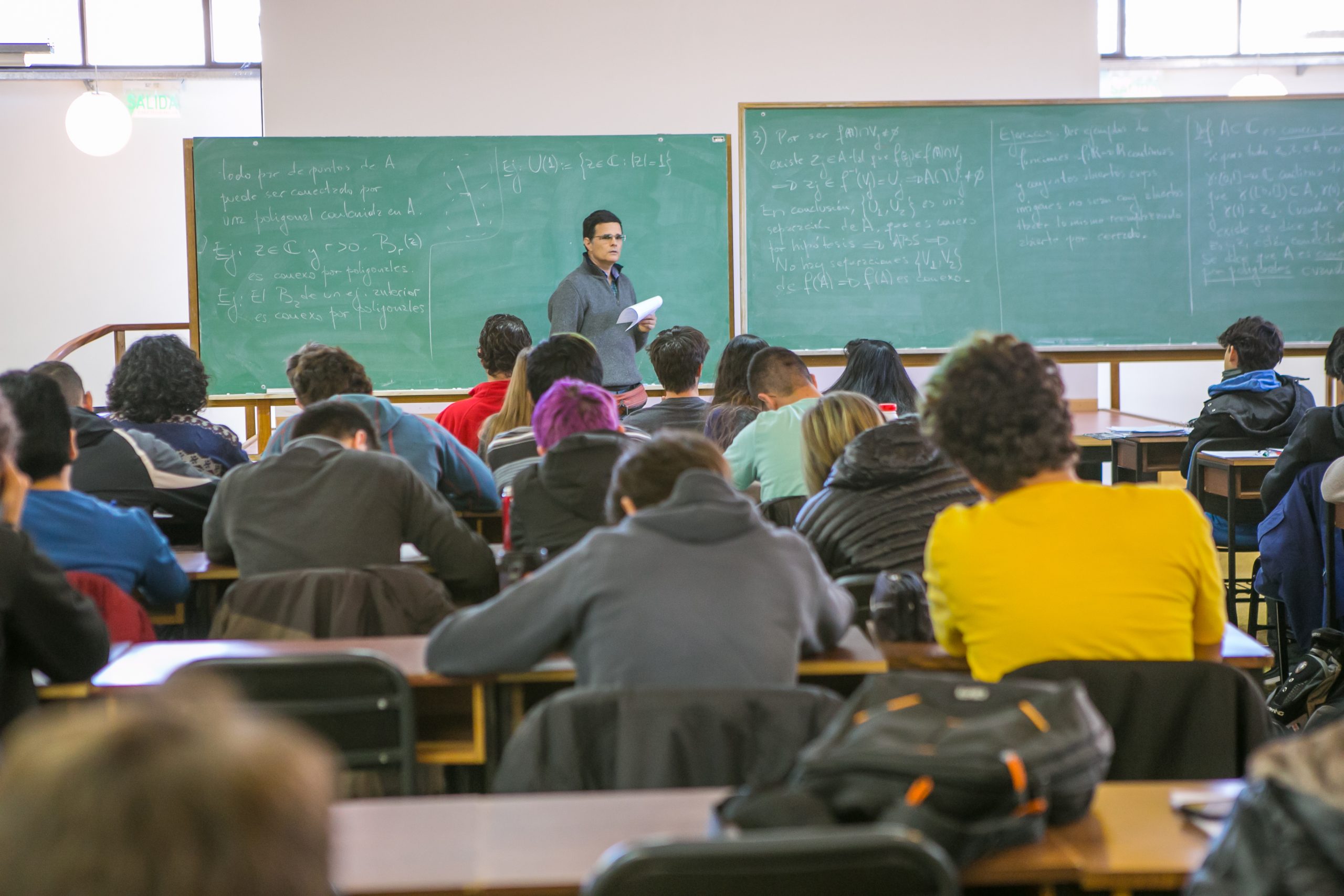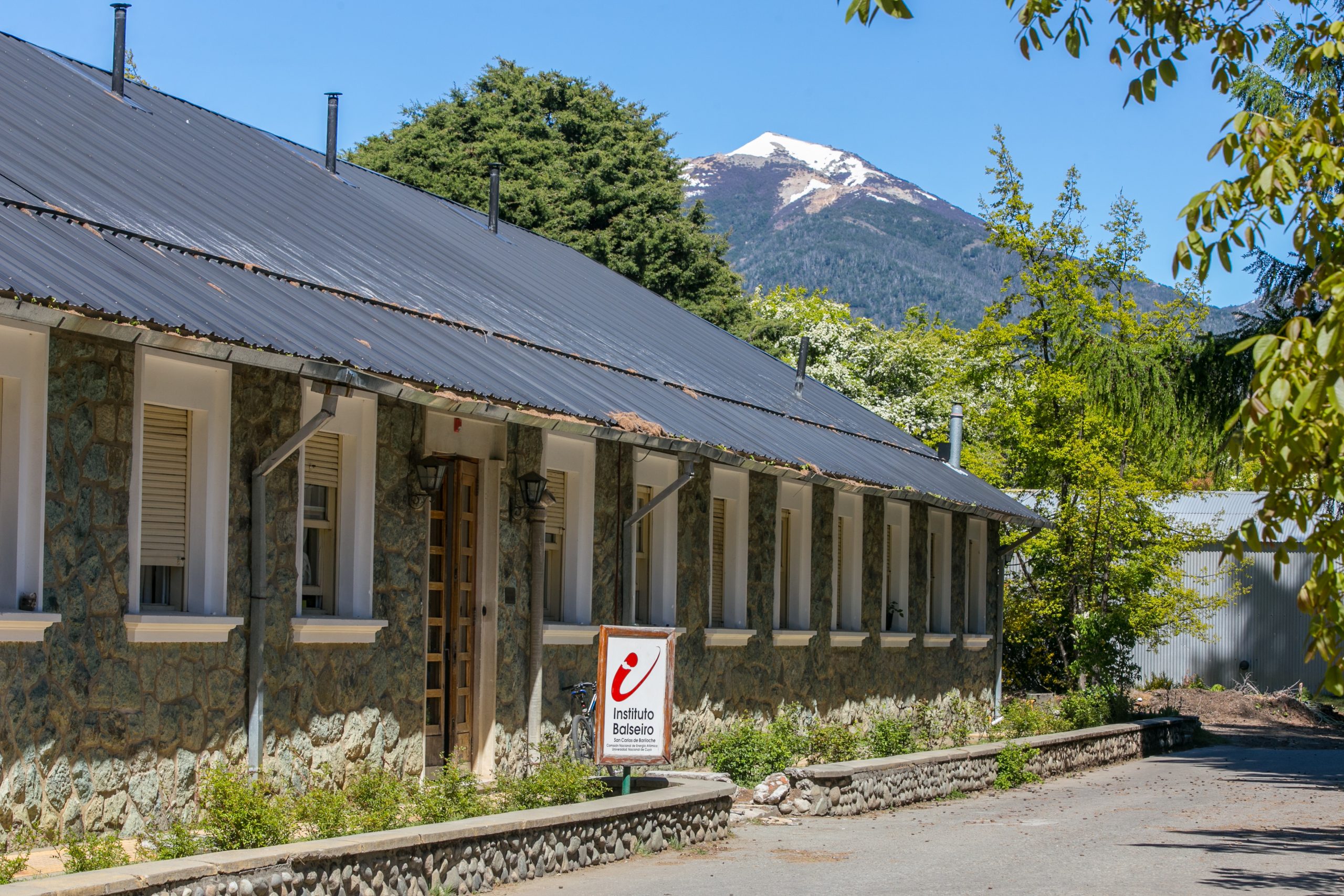about us
The Instituto Balseiro (IB)
The Instituto Balseiro (IB) is a public institution of higher education aimed at training excellence in physics and engineering professionals, while also fostering scientific knowledge and technological development. It is affiliated with the National University of Cuyo (UNCUYO) and the National Atomic Energy Commission (CNEA). Since its establishment in 1955, the Instituto Balseiro has been integrated into the Bariloche Atomic Center (CAB), one of Argentina’s leading centers for research, development, and innovation (R&D+I).
Believing in the necessity for our country to develop based on a high value-added productive matrix, the Instituto Balseiro contributes professionals and expertise to the nuclear sector for peaceful purposes and to strategic areas such as energy, food, health, environment, and communications.
“The Balseiro stands for science, technology, and innovation for today and tomorrow.”
Infraestructure
The infrastructure of the Instituto Balseiro and the Bariloche Atomic Center includes state-of-the-art laboratories, such as the educational nuclear reactor RA-6, the specialized science and technology library “Leo Falicov,” and the INTECNUS Center for Nuclear Medicine. Spread across 20,000 square meters in 12 buildings, it includes four student housing pavilions, a Laboratory of Experimental Physics, an Engineering Laboratory, a Telecommunications Engineering building, classrooms, administrative offices, covered gymnasiums, and various outdoor recreational areas.
Degree programs
Currently, the Instituto Balseiro offers 15 programs that educate professionals in various fields of physics and engineering. Advanced education includes both theoretical aspects and laboratory practice, with personalized teaching due to the high-quality ratio of teachers to students. The undergraduate degree programs offered by the IB are:
- Bachelor’s in Physics
- Nuclear Engineering
- Mechanical Engineering
- Telecommunications Engineering.
More information on admission requirements, scholarship access, and curricula is available here. The IB’s postgraduate degree programs are:
- Diploma in Nuclear Medicine
- Diploma in Radiotherapy
- Specialization in Clinical Medical Physics
- Specialization in Technological Applications of Nuclear Energy (CEATEN) jointly with the Faculty of Engineering of the University of Buenos Aires
- Master’s in Physical Sciences
- Master’s in Engineering
- Master’s in Medical Physics
- PhD in Engineering Sciences
- PhD in Nuclear Engineering
- PhD in Physics
- PhD in Interdisciplinary Health Research
More information on admission requirements, scholarship access, and curricula is available here.
Faculty
The faculty is composed of professionals actively engaged in science and technology, working at R&D&I centers and various companies such as INVAP. Most of them work at the Bariloche Atomic Center, and their research is funded by the National Atomic Energy Commission (CNEA), the National University of Cuyo (UNCUYO), the National Scientific and Technical Research Council (CONICET), and the productive sector. In this way, the experience acquired by each faculty member/researcher enriches the training of students in a stimulating and cutting-edge environment.
Graduates
Each professional who graduates from the Instituto Balseiro has the ability to solve novel and highly complex problems under pressure. The teaching style fosters learning and rapid adaptation to new environments. Following the foundational premise of José Antonio Balseiro, the founder and first director of the Institute, each student conducts practices in the IB and CAB’s first-class laboratories as an inseparable part of the curricula. The education is complemented by various elective subjects and special courses. In addition to the high academic level, the benefit of having full scholarships allows the student to develop their career with exclusive dedication. The IB has a graduation rate of 90 percent, and the actual duration of the degree program coincides with the time planned by the curriculum. The Instituto Balseiro trains professionals who, with an innovative and inquisitive perspective, provide solutions for a productive Argentina, based on Research, Development, Innovation, and environmental care.
“STUDYING AT THE IB IS DIFFERENT”.
Impact on Society
The main impact occurs through the training of human resources and the generation of knowledge and technology closely linked to Argentina’s social and productive sector. Graduates of the Instituto Balseiro work in sectors including science, technology, industry, and education. They have driven the creation of laboratories in CNEA atomic centers, public and private science and technology institutions in Argentina and globally. They have also contributed to the establishment of new university programs and institutes at UNCUYO and other universities. The CNEA was created in 1950, and the Instituto Balseiro was created five years later, as part of a state policy that contributes to the country’s productive development. Together, they have become a great success story: the CNEA is one of the most important technology company factories in Argentina. Some examples are: INVAP, NA-SA and its nuclear power plants, the Special Alloys Factory (FAE), the Argentine Nuclear Fuel Factory (CONUAR), DIOXITEK, the Neuquén Engineering Services Company (ENSI), the Heavy Water Industrial Plant (PIAP); and Nuclear Medicine and Radiotherapy Centers in various regions of Argentina. In the framework of its belonging to the CNEA and UNCUYO, topics such as nuclear technologies, nuclear medicine, new materials, microelectronics, nanotechnology, artificial intelligence, quantum technologies, telecommunications, and space exploration, among others, are developed. In addition, the Balseiro is characterized by generating an impact on the scientific culture of society through various activities of its three Secretariats and other areas of the institution, aimed at different audiences, such as students, teachers, entrepreneurs, journalists, and the general public.
A Variety of Activities
IB organizes a diverse range of activities directed at different audiences through its three Secretariats:
- The Secretariat of Extension and Scientific Culture offers teacher training courses, various activities such as high school student monograph contests, participation in university fairs, the Book Fair, and public colloquia. Its sphere also includes a choir, a film club, and a musical band.
For more information, click here. - The Secretariat of Linkage and Technological Innovation organizes proposals including the “IB50K” business plan competition for technology-based companies, Schools of Physics and Engineering, the Summer Scholarships program, and internships with national and foreign universities.
For more information, click here. - The Welfare Secretariat organizes activities for the entire IB community, focusing on providing support to its students. Proposals include recreational days, talks, and training sessions.
For more information, click here. - The Communication and Press Area communicates IB news through various channels. News, articles, and interviews on institutional events and science and technology news are published on the institutional website’s news section and social media channels, including Facebook, Twitter, Instagram, Threads, TikTok, and YouTube.
For more information, click here.

STUDYING AT IB IS DIFFERENT
“Learning to solve new problems, challenges, imagining and developing technologies that have never been envisaged before. Being at the forefront, opening paths, generating knowledge and technology”
FOR MANY REASONS…
Academic life
There are a number of reasons that pave the way for students at IB towards a successful graduation.
First, the full scholarships awarded to each student allow them to focus all their attention and dedication on their studies.
Second, the number and the trajectory of professors – all researchers in activity – allow for the creation of a strong professor-student bond, which fosters an effective transmission of professional experience and permanent contact for consultation and discussion.
Third, the academic calendar is carefully planned. Students take classes 5 mornings and 4 afternoons a week, distributed between theoretical and experimental classes and languages. Recesses are scheduled during a period that guarantees enough time for exam preparation, rest, and leisure activities. The graduation date is fixed from the beginning, based on the approval conditions.
“The IB is a very demanding place. It requires a great vocation. An outstanding aspect is the high academic level in experimental subjects.”
Testimonies
Bonds, in the words of students
“You live together with your classmates, you learn from recognized experts on their fields, and when you go for a sandwich you find yourself lining up with a bunch of doctors.”
“I thought this was a much more competitive and less cooperative environment.”
“When you live in the campus of the CAB, you develop a feeling of community in the dorms.”
“At the IB, you are and INDIVIDUAL. All your suggestions are taken into account; student’s opinions really count.”
“The professor-student bond is very tight. This allows us to clear up doubts immediately, since there is always someone available to explain the contents given. Besides, if a Saturday morning a new doubt arises, you always have a professor living on campus ready to receive you.”
All students can participate of the activities organized by the Centro de Estudiantes del Instituto Balseiro (Student Union of the IB): library of general interest, music equipment, video, and sports elements. IB students organize a Cinema Club within the facilities of the CAB.
Additionally, those applicants to the IB who wish to know about students’ life at the Institute or any other aspect related to the academic offer from a gender perspective can contact Dr. Karen Hallberg karen@cab.cnea.gov.ar.
Life on Campus
Students have the option of living on campus, surrounded by the Patagonic Andean forests and mountains. The dorms accommodate two students each and count with a private bathroom and a fridge. Students have access to a common fully equipped kitchen and a TV room.
Even though students also have the option of living outside the campus, it is highly recommended for new students to stay at the dorms on campus to facilitate integration and convenience in daily activities.
Students can practice sports on the campus; they have access to tennis courts, racquetball courts, football fields, and a gym. There is also a leisure area that counts with a table tennis table, a pool table, and a table football table. During summer, many students visit the National Park, and during winter they go skiing.
teachers
AUTORITIES
Directory: Dr. Mariano Cantero director@ib.edu.ar
Deputy director, School of Sciences Dr. Marcelo Kuperman vicedireccion@ib.edu.ar
Deputy director, School of Engineering Dra. Graciela Bertolino vicedireccion@ib.edu.ar
Scholarships studies
The Instituto Balseiro has full scholarships from the CNEA and other institutions, with the condition of dedicating oneself exclusively to study in order to graduate within the expected timeframe. The scholarship covers the costs of accommodation, food, notes, and various expenses. More information is available here.

CONTACT INFORMATION
Av. Bustillo km 9,500
R8402AGP San Carlos de Bariloche
Río Negro – Argentina
Teléfono: +54-294-444-5162 / 3
Office hours: Monday through Friday from 9:00 to 5:00
-
General Information: info@ib.edu.ar
-
Undergraduate course information: alumnos@ib.edu.ar
-
Outreach Commitee: difusion@ib.edu.ar
-
Communication and Press: prensa@ib.edu.ar
